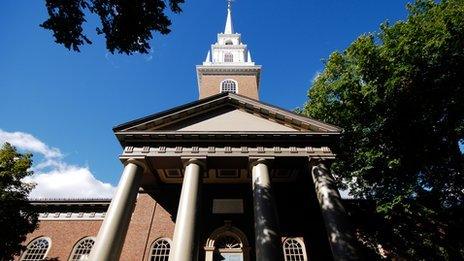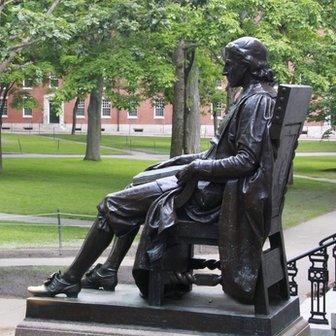What do young Harvard graduates believe?
- Published

Harvard's Class of 2014: 42% had sought mental health counselling
What are the views and experiences of the bright young things leaving Harvard University this summer?
These will be the movers and shakers in US society in the years ahead, many of them about to step into influential jobs in business and government.
Harvard's campus newspaper, external, The Crimson, has provided a fascinating snapshot of this young US elite, based on a sample of about half of this year's leavers.
How do these offspring of the internet age view the world?
Perhaps most startling - and saying something about the pressures and practices of modern students - 42% had sought mental health counselling during their time at Harvard.
This is a profile of a year group by numbers - so there's no commentary to explain these figures.
But if these are going to be the politicians and financial leaders of the future, there are 17% who admitted to cheating during their studies. And they were suspicious of each other, estimating that 53% of their classmates had cheated.
Private lives
Among those planning to enter government or politics, 39% have used marijuana while students.
There are 15% of Harvard graduates who are gay - and this survey shows widespread acceptance of same-sex marriage.
Among college leavers who identify themselves as "conservative or very conservative" there are 59% who support same-sex marriage.
In terms of politics, 80% of these youngsters who voted said they backed former Harvard student, Barack Obama at the 2012 presidential election.
They are much more liberal than the general population - with 59% describing themselves as liberal or very liberal, compared with 14% who are conservative or very conservative.

Only a minority of students were atheists or agnostic
These graduates are also an example of a deep geographical divide, which in turn represents a social divide. They are disproportionately likely to come from four places - New York, Washington DC, Massachusetts or California.
And a huge 64% of them intended to live in one of these four clusters.
In terms of career aspirations, the most popular destinations are finance, consultancy and technology.
Only 26% of people planning to go into finance described themselves as "liberal or very liberal".
In this mosaic of US identity, fewer than two in five, 38%, are atheists or agnostic.
There are contrasting experiences among their private lives. There are 21% who will leave university as virgins - while 12% claim to have more more than 10 sexual partners while students.
The most typical response was to have had two sexual partners while at university.
Among male students, 48% said they regularly watched pornography, while 59% of female students said they never watched pornography.
For both male and female students, social life often involved drinking alcohol.
More than a third of ethnic minority students reported feeling "marginalised because of their race" while at university.
It represents a fragmented view of America's gilded youth, the people who could be mid-century US leaders - not really fitting into any neat categories and with sharply polarised personal experiences.